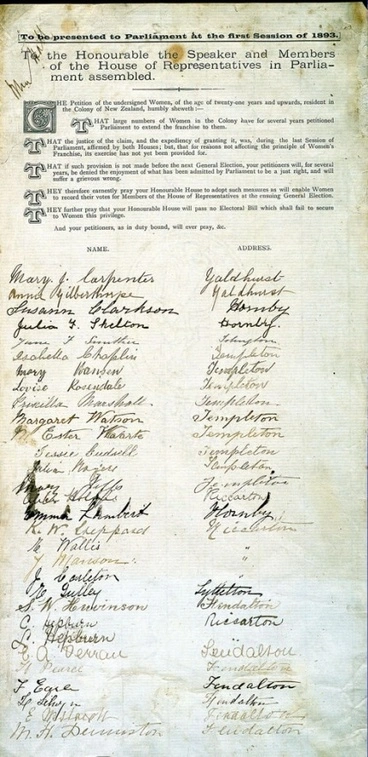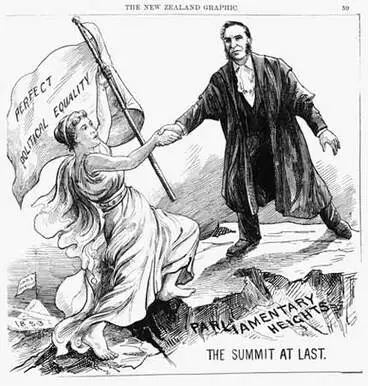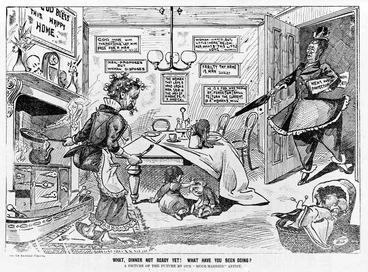“All that seperates, whether of race, class, creed or sex, is inhuman, and must be overcome.” [1] Kate Sheppard was an individual that believed in universal liberties and the rights of women and children. Sheppard demonstrates ideas of traditional kiwi culture because she helped develop the democratic, unified, country seen today. The feminists identity was a breakthrough for political and social change in NZ. She dedicated her life to creating a better future and her culture runs heavily through each New Zealander, identifying as a kiwi.
Kate Sheppard, a face well recognised in New Zealand.
Kate Sheppard
Manatū Taonga, the Ministry for Culture and Heritage
Sheppard's biggest project was to be successful in the vote for women. Sign that could have been used in protest.
Full Time Feminist / Women's Rights Are Human Rights placard
Museum of New Zealand Te Papa Tongarewa
Sheppard was a keen political activist, addressing issues around the rights of women and children. [2] The feminist believed that political systems across the world were corrupt and people outside of the middle aged, white man stereotype, should be entitled to participate in political activities. Sheppard started the success of women’s suffrage in New Zealand (NZ) and then took her knowledge and skills to bring change to other areas of the world. [3] Although Sheppard’s identity was often hidden in her written texts, she took to the streets using both physical and verbal political actions. [4] She was considered as a born leader, a world changer and a New Zealander.
In 1893 the NZ Electoral Act was ratified to legally allow the women’s right to vote. [5] NZ led the rest of the world into a more democratic and equal society. Sheppard was the main protagonist in organising political reforms, organising petitions and social interactions with other members of the public. [6] The Kiwi identity of the activist is created based on those actions and her determination she led with. Her identity was shaped by her empowerment and she wanted to create an equal society among New Zealanders. Following the Māori wars and unjust colonisation practises in NZ, there were huge inequalities in society - Not only amongst women and children. [7] These were particularly based around human, land and political rights. Sheppards vision for a liberal NZ and a more united society became supported by many people. [8] Allowing individuals, especially women and children, to have aspirations and hope in life again.
The petition that allowed womens voting rights.
Suffrage petition, 1893
Manatū Taonga, the Ministry for Culture and Heritage
NZ traditional depictions of ‘kiwi culture’ are based around icons such as Sheppard. Sir Edmund Hillary, Āpirana Ngata and Ernest Rutherford are other kiwi icons that help portray the kiwi culture. [9] All of these people had aspirations that were not selfish and would better other individuals and/or societies at a large scale. They believed that changing the world or society they lived in, was going to confirm an easier future for generations. This is kiwi culture. Being a New Zealander is participating in your society, it is dealing with issues as a nation and overcoming them, it is encouraging your neighbour to speak against policies and acts they do not believe in - being a New Zealander is being an active member of our nation.
Sheppard is traditional because she is the root where the democracy stem began. The women’s voting rights enactment opened doors for Māori and women to sit in Parliament and then lowered the voting age, in attempt, to achieve universal suffrage. [10] The empowerment that followed after women's suffrage, is still identified in contemporary NZ. Especially since in 2017 election, 38% of Parliamentarians were women. [11] NZ has had and will always have, an active political/society relationship. Lobbyist groups still protest in local and national levels within NZ and are often successful in their actions. Legislators understand that part of the kiwi culture is democracy and is heavily implemented.
Sheppard was also openly motivated by humanitarianism and justice. She was an active member of the prohibitionist group, with the aim of eliminating intoxication and abuse towards women and children. Prohibition was democratically voted for in the early 1900s and was to create, once again, a better society. Although prohibition might not have been as successful as desired, it was the first significant matter that showed universal suffrage in NZ. The project created awareness to household drunken behaviour and address these issues for the first time ever in NZ [12].
Kate Sheppard National Memorial
Christchurch City Libraries
Women's Suffrage Journal, London, 1887
Archives New Zealand Te Rua Mahara o te Kāwanatanga
National Council of Women, Christchurch
Alexander Turnbull Library
The only subject in question regarding Sheppard’s identity, is whether or not she can be classified as a ‘kiwi’, after being born in London. Michael King states “New Zealanders who are committed to this land and its people are no less “indigenous” than Māori [13]. Although King’s text is confronting issues in contemporary society between Māori and Pakeha, the quote identifies that New Zealanders are people who are committed to the land. Based on that definition, Sheppard is a New Zealander. She was involved in the progression of NZ land, rights and political development and wanted the best for the nation. She is a woman of celebration and is remembered in daily events to be recognised.
Kate Sheppard memorial lecture
Massey University
Women's Suffrage
DigitalNZ
Cartoon against women's suffrage
Manatū Taonga, the Ministry for Culture and Heritage
Kate Sheppard was and still is a leading kiwi icon. She used her morals and beliefs to shape kiwi identity and create change within a nation. Sheppard encouraged NZ to be democratic and fight for what they believe in. Her beliefs and education allowed her to demonstrates liberties between sex, race and age and tell society, that justice can be asked for and the state is required to listen. This has been heavily implemented on contemporary society and the democratic success NZ experiences today.







